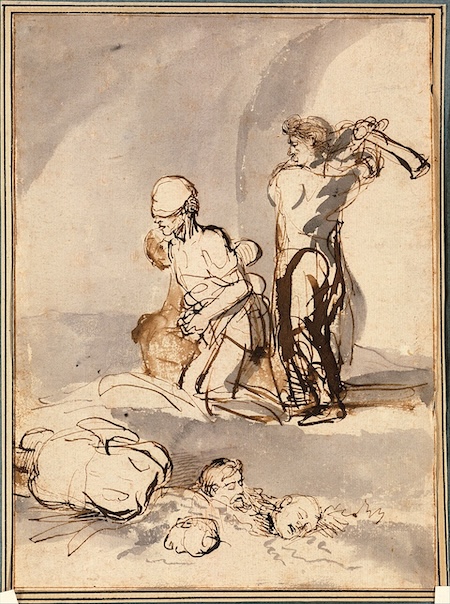Anabaptist printer Thomas von Imbroek Lost His Head

[ABOVE: Rembrandt, Beheading of Anabaptist Martyrs, c. 1640—Met Museum / public domain, Wikimedia]
THOMAS VON IMBROEK was a printer at Cologne on the Rhine. He was also an Anabaptist—not of the revolutionary kind, such as John of Leiden had been, but a man of a peaceable, Christian spirit. He founded congregations of believers outside of the established church and wrote a confession of faith for them.
His failure to baptize his children, however, seems to be what brought him to the attention of authorities. After his arrest, a pair of priests questioned him closely on his rejection of infant baptism. When he insisted that only believers should be baptized, they pronounced him a heretic. He was brought to the rack, but was not tortured on it since the city’s magistrates disagreed on how to deal with him. Days passed in which he was cruelly tortured by other means and pressured to convert to Catholicism.
Eventually he was taken to a landgrave’s house (a noble equivalent to a count.) The landgrave would have released Imbroek had he not feared reprisal from the German emperor and the bishop. Therefore, Imbroek was eventually condemned to death as a heretic in his presence.
Meanwhile, his wife wrote him letters, encouraging him to stand firm. In reply, he assured her that the Lord “refreshes the afflicted souls that thirst for Him. He is a shadow from the heat of the sun,” and quoted from Matthew and Isaiah to back up his hope.
He added, “Tell the brethren to take care of the novices (young believers) and to pray earnestly for me. I will also pray for them, as much as is in my power. Remember my bonds. The Lord be with your spirit. Amen.”
To his persecutors he offered this speech:
“I am willing and ready, both to live or to die. I do not care what happens to me. God will not let me down. I am comforted and in good spirits while yet on the earth. God gives me friendly assurance, and my heart is encouraged through my brothers. Sword, water, fire...cannot frighten me...All the persecution in this world shall not be able to separate me from God.”
Imbroek was just twenty-five when an executioner lopped off his head on this day, 5 March 1558.
—Dan Graves
— — — — —
For a true-life story of Anabaptists, watch The Radicals
The Radicals can be purchased at Vision Video







